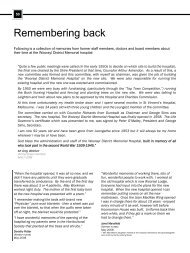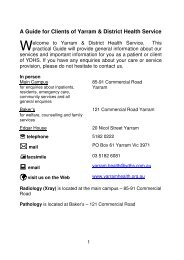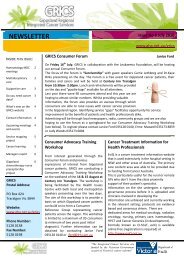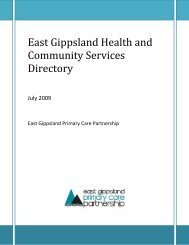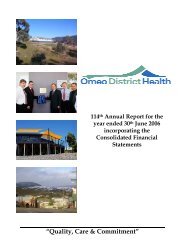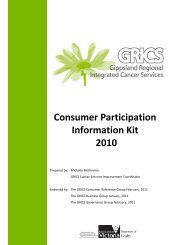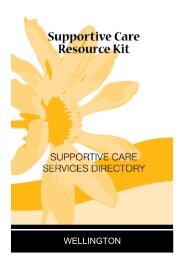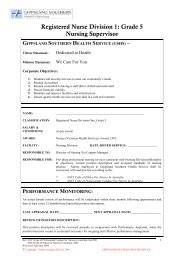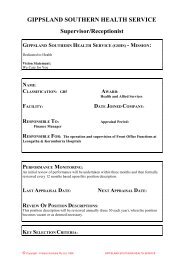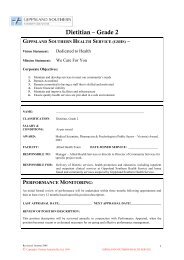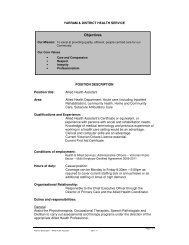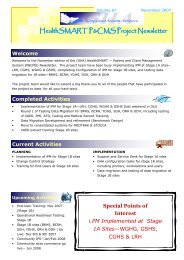HOSPITAL PATIENTS GUIDE
HOSPITAL PATIENTS GUIDE
HOSPITAL PATIENTS GUIDE
Create successful ePaper yourself
Turn your PDF publications into a flip-book with our unique Google optimized e-Paper software.
PATIENT INFORMATION<br />
Patients with private health insurance have the<br />
choice to be treated as either a public or private<br />
patient – unless you have agreed with your<br />
surgeon to have you procedure as a private<br />
patient. We encourage you to use your private<br />
insurance if you have it because by doing so you<br />
are assisting the Health Service to maintain<br />
provision of the best care and facilities for the<br />
community we serve.<br />
If you elect to be a private patient please ensure<br />
that your health fund membership is up to date,<br />
covers your admitted procedure (if surgical), and<br />
that you have your membership card/book or<br />
details with you. It is your responsibility to be<br />
aware of your level of cover and to ensure that<br />
your membership is current.<br />
Transfer to Another Facility<br />
Sometimes it is necessary to transfer patients to<br />
another hospital, nursing home or healthcare<br />
facility. This is only done in consultation with you<br />
and your carer/family, or in emergency situations.<br />
Transfer may be by air or road ambulance, or<br />
hospital/volunteer transport service.<br />
Please check that any follow up appointments<br />
have been made and that your medication<br />
requirements have been arranged prior to<br />
discharge – refer to medication heading.<br />
Discharges normally occur before 10.00 am. If<br />
you are having a day procedure you will be<br />
discharged on the same day. You must make<br />
arrangements for someone to drive you home, as<br />
legally you are not able to drive a motorised<br />
vehicle for a minimum of 24 hours post<br />
anaesthetic. It is recommended that you have<br />
someone stay with you overnight for this postanaesthetic<br />
period.<br />
Discharge at Own Risk<br />
With few exceptions (for example in case of<br />
infectious diseases) you have the right to leave<br />
hospital when you choose. This may be a serious<br />
step when taken against the advice of your<br />
doctor and could pose a significant threat to your<br />
well-being. If you choose to be discharged under<br />
these circumstances you will be asked to sign a<br />
disclaimer form and the responsibility for this<br />
action will rest with you.<br />
Discharge<br />
Management of your treatment may continue<br />
after you leave hospital and return home. Before<br />
you are discharged the hospital will make sure<br />
that you and the relatives or friends involved in<br />
your care know how to look after you at home,<br />
and understand what is involved. Please do not<br />
hesitate to ask for treatment programs to be<br />
written out for you if you have any doubts. Your<br />
doctor or nurse will answer any questions you<br />
may have and will arrange necessary support<br />
services such as District Nursing, personal care,<br />
rehabilitation, Meals on Wheels, or Home Help.<br />
4




